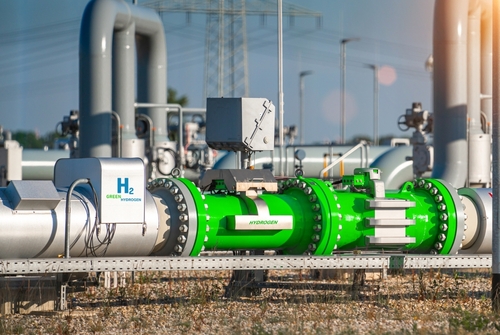
Two projects partly located in Pennsylvania will become some of the first clean hydrogen hubs in the country after being selected by the U.S. Department of Energy (DOE) on Friday.
The projects, known as the Appalachian Hydrogen Hub and the Mid-Atlantic Hydrogen Hub will share in the $7 billion awarded by the DOE to launch seven Regional Clean Hydrogen Hubs (H2Hubs) across the nation. The projects are designed to accelerate the commercial-scale deployment of low-cost, clean hydrogen as an energy product that can be produced with zero to near-zero carbon emissions. Pennsylvania was the only state to be part of two selected projects, which will receive up to $1.675 billion in total federal funding.
“Today, Pennsylvania is positioning itself as the leader of our country’s clean energy future and creating thousands of new, good-paying union jobs,” Gov. Josh Shapiro said.
President Joe Biden and U.S. Secretary of Energy Jennifer Granholm traveled to Philadelphia on Friday to announce the selections. Part of the Infrastructure Investment and Jobs Act, the Hydrogen Hubs will drive $50 billion in public-private sector investments into the clean hydrogen economy creating tens of thousands of jobs, reducing carbon emissions and increasing energy independence, the White House said.
The Appalachian Hydrogen Hub proposed by the Appalachian Regional Clean Hydrogen Hub (ARCH2) in West Virginia, Ohio and Pennsylvania will receive up to $925 million to leverage the region’s access to low-cost natural gas as a way to produce clean hydrogen and permanently store the associated carbon emissions. The project is expected to create more than 21,000 direct jobs, including more than 18,000 in construction and more than 3,000 permanent jobs, some of which officials hope will provide opportunities for workers in coal communities.
The Mid-Atlantic Hydrogen Hub proposed by the Mid-Atlantic Clean Hydrogen Hub (MACH2) in Pennsylvania, Delaware and New Jersey will receive up to $750 million and focus on hydrogen-driven decarbonization in the region while repurposing the region’s oil infrastructure and using existing right-of-ways to develop renewable hydrogen production facilities from renewable and nuclear electricity using established and innovation electrolyzer technologies to reduce costs and drive technology adoption. The project is expected to create 20,800 direct jobs, including 14,400 in construction jobs and 6,400 permanent jobs.
“Pennsylvania is a global energy leader that is home to abundant natural resources, industry thought leaders, and cutting-edge innovators,” said Pennsylvania Chamber of Business and Industry President & CEO Luke Bernstein. “We applaud those Pennsylvania companies and partners who worked so hard to facilitate this historic opportunity that will create jobs, protect our environment, and benefit our Commonwealth, the nation, and the world,” he added.
Kurt Knaus, spokesman for the Pennsylvania Energy Infrastructure Alliance, said the announcement solidified the state’s place in the country’s energy economy.
“If anyone still had questions about the value of Pennsylvania’s energy resources, this puts them to rest,” Knaus said. “Our pipelines, energy storage facilities, and distribution systems make us the perfect choice for not one, but two hydrogen hubs. The successful and speedy transition to a clean hydrogen economy relies heavily on abundant resources, a robust energy infrastructure network, and skilled workers with the experience to build out these systems safely, quickly, and responsibly. Pennsylvania has it all. This investment will generate thousands of family-sustaining union jobs, supercharge our economy, and provide lasting environmental benefits.”
A widely supported hub also based in western Pennsylvania, known as the Decarbonization Network of Appalachia (DNA H2Hub), was not included as part of the DOE’s announcement. Bernstein said the Chamber was hopeful that the DNA H2Hub would be considered for potential funding opportunities in the future.